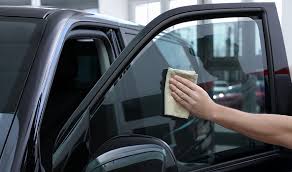Car window tinting has gained significant popularity in recent years, offering both aesthetic appeal and functional benefits. Whether for enhanced privacy, heat rejection, or UV protection, understanding the costs associated with tinting your vehicle’s windows is crucial. This guide will break down the various factors influencing tinting costs, helping you make an informed decision.
Factors Influencing the Cost of Window Tinting
Type of Tint Film
- Dyed Tint: Often the most budget-friendly option, dyed tint provides a darkened appearance but has lower durability and heat rejection compared to other types. Expect to pay between $50 and $200 for installation.
- Metalized Tint: This type of film reflects heat and UV rays, providing higher performance than dyed options. The price typically ranges from $150 to $300, depending on the brand and vehicle size.
- Ceramic Tint: Considered the premium option, ceramic tint offers excellent heat rejection and UV protection without interfering with electronic signals. Prices can range from $300 to $800, making it a worthwhile long-term investment.
Vehicle Type
- Sedans and Coupes: The cost for tinting these vehicles is generally lower due to fewer windows, ranging from $50 to $300 for standard films.
- SUVs and Trucks: Larger vehicles come with higher tinting costs, primarily because of the increased surface area. Expect to spend anywhere from $150 to $600.
- Luxury Vehicles: Specialized treatments may result in elevated prices, often starting at $400 and going up, reflecting the premium nature of the vehicle.
Tinting Method
- DIY Tint Kits: While doing it yourself can save money, costs for kits typically range from $30 to $150. However, challenges in application and potential mistakes can lead to additional expenses down the line.
- Professional Installation: Hiring a professional ensures quality and longevity. Costs vary by location, but expect to pay around $50 to $100 per hour for labour, with total installation costs falling between $200 to $600.
Understanding Local Regulations
State Laws on Window Tinting
Before proceeding with window tinting, it’s crucial to check local regulations. Many states have laws governing the permissible tint levels and reflective qualities. Non-compliance can result in fines or the requirement to remove the tint, which could lead to unforeseen additional costs.
Average Costs Breakdown
- Budget Considerations:
- Low-end tint options: $50-$100
- Mid-range tint options: $150-$300
- High-end tint options: $400 and above.
- Additional Costs:
- Removal of old tint: $50-$100
- Repairs and modifications may also factor into the total costs, especially if the existing film is damaged.
Conclusion
In summary, understanding the various factors influencing window tinting costs is essential for making an informed decision. Whether you prioritize personal preferences, legal regulations, or budget constraints, careful consideration will lead you to the best option for your vehicle. By investing in quality tinting, you’ll not only enhance your car’s appearance but also enjoy the numerous benefits that come with it.
What are the benefits of tinting car windows?
Window tinting offers several benefits, such as enhanced UV protection, reduced heat in the vehicle, increased privacy, and prevention of upholstery fading.
Can I install window tint myself?
While DIY installation can save money, professional installation often ensures a perfect finish and longevity. Weigh the pros and cons based on your skill level and available tools.
How long does window tint last?
The lifespan of window tint varies by type: dyed films can last 1-5 years, metalized films generally last 3-7 years, while ceramic films can last over a decade with proper care. Factors affecting longevity include environmental exposure and care practices.


